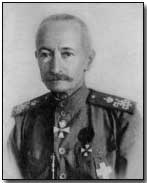Primary Documents - Alexei Brusilov on the Brusilov Offensive, June 1916
 The Brusilov Offensive of
June 1916, overseen by able Russian commander
Alexei Brusilov,
achieved stunning - and, for most observers surprising - initial success.
The offensive began in spectacular fashion, demolishing the Austrian Fourth
and Seventh Armies. The Austrians lost a staggering 1.5 million men
(including 400,000 taken prisoner) and ceded some 25,000 square kilometres
of ground.
The Brusilov Offensive of
June 1916, overseen by able Russian commander
Alexei Brusilov,
achieved stunning - and, for most observers surprising - initial success.
The offensive began in spectacular fashion, demolishing the Austrian Fourth
and Seventh Armies. The Austrians lost a staggering 1.5 million men
(including 400,000 taken prisoner) and ceded some 25,000 square kilometres
of ground.
With the launch of the Brusilov Offensive any hopes the Austrians harboured of bringing about victory in the east were extinguished. Austrian attacks in Italy ceased; and Romania finally entered the war with the Allies. But for the failure of Alexei Evert to join the attack against German forces in the north (as planned), the overall success of the Brusilov Offensive would probably have been assured. As it was the Offensive gummed up in Brusilov's need to save the Allies' latest ally - Romania - from a German invasion.
Reproduced below is Brusilov's official statement during the first flush of the offensive's initial success.
Click here to read the report produced by the official German observer with the Austrian forces. Click here to read a Hungarian account of Russian incursion into Hungarian territory during the offensive; click here to read a similar Austrian account; click here for a Polish landowner's account.
Alexei Brusilov on the Brusilov Offensive
If there remain any Germans still hopeful for their cause, let them realize that today, when the Central Powers have lost the initiative and are finding a difficulty in refilling their ranks, Russia has not yet reached the zenith of her power, which will only be approached next year, when she will have the largest and best army since the beginning of the War.
Next year we shall have material on an equality with the enemy and a superiority in human resources, which should steadily increase as long as the War endures. Our new levies which come in each year equal our best troops, and, as I believe, they are far superior to anything which the enemy can still find to send against us for next year's campaign.
To illustrate the desperate shortage of the German armies, I need only recall the well-established fact that four divisions were hurried here from France soon after June 4th, when our offensive began. These were the 19th and 10th, forming the 10th Active Corps, and the 11th Bavarian and 43rd Reserve Divisions. We were expecting the 44th Division, but it did not appear.
As usual, the Germans had underrated French powers of resistance. Although 17 divisions remained before Verdun, the enemy found it impossible to move another man hither, and as soon as the British armies advanced all idea of transferring troops had to be abandoned.
The units confronting us represented the maximum effort of Germany. They were moved about along the Russian front chiefly to the southward, in order to fill the gaps left by the fleeing Austrians.
Source: Source Records of the Great War, Vol. IV, ed. Charles F. Horne, National Alumni 1923
Stormtroopers comprised specially trained German assault troops used in 1918.
- Did you know?
